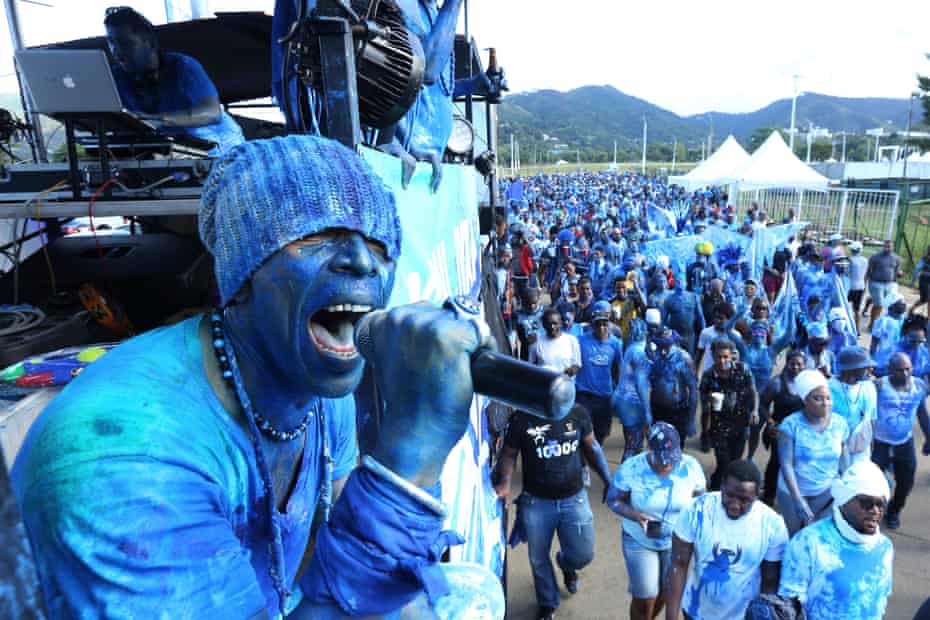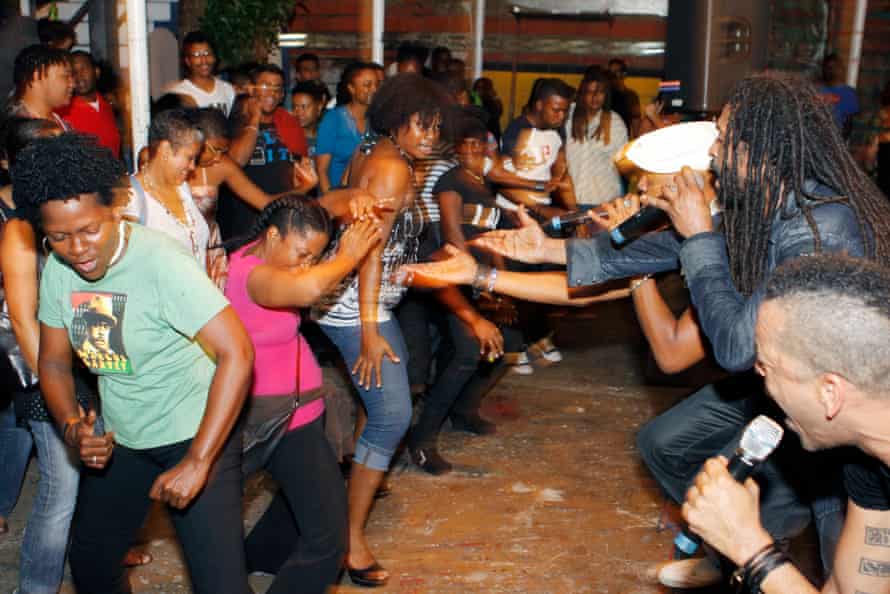You would expect a tune known as Dancing Sneakers to celebrate the unfettered joy of a great boogie, but Network Rapso Riddum Band’s 1981 monitor did very the reverse. Direct vocalist Brother Resistance – whose loss of life on 13 July sent shockwaves by way of the Caribbean tunes local community – utilised Dancing Sneakers to castigate his fellow Trinidadians for embracing international varieties this kind of as disco, providing caustic lyrics in a move laden with preacherly indignation.
The music heralded the arrival of a new hybrid seem in Trinidad and Tobago – just one that has not had fairly the worldwide impact of dancehall, reggae or other Caribbean variations but which is the supply of some of its most interesting and political tunes, dubbed “rapso” for its melding of rap and soca.
The bedrock of the rhythm was a pulsating variant of the predominant soca style that reflected the African and Indian origins of the island’s inhabitants, with a vivid metal-pan melody obviously signalling their present place, however the bass was couched in funk, and the disjointed kick drum pointed to Afrobeat. The vocals, meanwhile, took the social consciousness and reportage of calypso and gave it the rhythmic heft and confrontational slant of nascent rap new music in the US.
“Rapso emerged in the frustrated communities of east Port of Spain right after the 1970s,” suggests Wendell Manwarren of the group 3canal, who have been keepers of the rapso flame considering the fact that the late 1990s. “The gist in its early days was that sense of self-resolve and pride in self. With Dancing Sneakers, Brother Resistance established himself up as a commentator and sharp social critic.” Manwarren says that mainly because of their reduced course qualifications and embrace of Rastafarian things, rapso was considered “with a small disdain from sure quarters. But by some means Brother Resistance was capable to transcend that.”
Crucial music these as Ring De Bell, Cyar Take That and weather alter clarion Mother Earth ended up all major hits, and in addition to aiding band customers Brother E-book and Karega Mandela to rating accomplishment of their individual, Brother Resistance mentored young artists who assisted continue to keep rapso modern. Although the variety was unnamed until eventually the launch of Dancing Shoes, Brother Resistance noticed before figures as the correct rapso progenitors.
“Brother Resistance stated: we are accomplishing rapso tunes, which is the electricity of the term in the rhythm of the term, but we are not the innovators,” states Manwarren. A vital inspiration was Lancelot Layne’s 1971 music Blow ’Way, and its traces: “Don’t believe what foreigners do is greater than you since that ain’t true / it is a mental block which is hard to unlock.”
Manwarren explains: “It was positing the idea that we wanted to invest in ourselves. Independence [from the UK] experienced resulted in the disappointment that brought about the black electric power motion – black people weren’t seeing them selves represented in specified arenas. All over that similar time period, Cheryl Byron was the equivalent of a dub poet, with hardcore black consciousness and expertise of self, and the to start with particular person to choose this variety into the calypso tent.”

ean Drakes/LatinContent/Getty Visuals
As the influence of Layne and Byron fed a increasing rapso scene, Brother Resistance began touring abroad, recording his landmark debut album Rapso Consider More than at the Brent Black Songs Co-Op in London in 1986, which brought the model a entire new audience. He opened the Rebellion Tradition Property on All Saints Street in Notting Hill, west London, all through a time of heightened racial pressure and frequent law enforcement harassment (as demonstrated in the BBC tv documentary Carnival Street). He also staged spoken-term events through the Apples and Snakes collective with fellow poets these types of as Benjamin Zephaniah, before dividing his time in between Trinidad and Germany.
Then, during the early 1990s, rapso’s next wave harnessed the creation values of east coast US hip-hop and Jamaican dancehall, as read in the perform of Kindred, Homefront, and Ataklan.
“Our rapso was diverse for the reason that we were being of that rap era, so our tunes was a hybrid of hip-hop and Trini types,” suggests Omari Ashby of Kindred, whose debut launch, Dis Trini Could Circulation, turned a feeling in 1992. “My older brother was deeply into Run-DMC and I was a lot more into Whodini, and when General public Enemy came out, that was it for me. It was expressing everything I was imagining.” Ashby also grew up in a home where his mom and dad “had every single type of songs, so in my brain [calypso singer] Mighty Shadow was just as major a star as Michael Jackson. At any presented instant I would pay attention to Steel Pulse, Boy George, [calypso singers] Black Stalin and Brother Valentino. So Dis Trini Could Move was stating that you could sound like on your own and even now mashup the dance.” Ashby suggests that some of rapso’s old guard have been saying “these men are spoiling the matter, this new type is not seriously rapso. But Brother Resistance noticed it as the youth acquiring their voice.”
“That 2nd wave had a ton more of a hip-hop vibe, but several of us say that rapso is not a seem per se it is a philosophy, an frame of mind, a stance,” says Manwarren. “Kindred sent Dis Trini Could Movement to a stomping hip-hop defeat, but with that added Trini inflection Homefront was stating factors this sort of as, ‘Give oneself a opportunity, permit your spirit start out to dance, free of charge oneself to be on your own,’ and Ataklan arrived with a full distinctive vitality, threatening to burn up down anything with fire.”
Manwarren’s 3canal spearheaded the more rapso wave that arose in the late 1990s, using the form in a different course by way of sung lyrics with three-part harmonies following being lively in a theatre troupe and forming a j’ouvert band. The latter featured at the rigorous cultural outpouring of j’ouvert that starts each individual carnival in the wee hours of the Monday prior to Ash Wednesday, in which revellers adorn their bodies with paint, mud or oil prior to dancing with reckless abandon in a symbolic re-enactment of their ancestors’ emancipation from slavery and indentured labour.
“When we arrived on the scene with our j’ouvert band, I had been producing something in an try to outline the concept, and Brother Resistance explained that what I was producing was in a rapso kind,” suggests Manwarren. “In limited purchase, we have been recording background vocals for him in the studio and the future issue you know, we experienced a recording offer.”

3canal’s 1997 hit Blue celebrated j’ouvert as a linchpin of carnival culture, and Talk Yuh Chat attacked political hypocrisy, even though some felt their design strayed also significantly from the roots. “3canal’s approach experienced a lot of harmonies and singing, but with rapso power, so that widened the definition,” states Ashby. However rooted in Brother Resistance’s innovations, the broader type dominated Trinidadian songs into the noughties, “and I would argue it continue to dominates now,” Ashby indicates. “It is being subsumed underneath soca, but the vocal technique is the exact same.”
“Trinidad is a tiny, fickle, fecund culture,” Manwarren concludes. “People are often on the lookout for the upcoming new point, so even though there are other types that we have now, it’s continue to rapso in an additional sense. I believe that was the genius of Brother Resistance simply because he understood that if it all experienced to seem like his stuff, that would be the conclude of it. Numerous younger artists now credit rating his encouragement as becoming sizeable in their progress. Brother Resistance was potent, silent and usually experienced a all set smile he did not say a great deal, but spoke volumes with his eyes, and he’s responsible for a ton of the superior vibrations in the area. Give many thanks for his remaining.”
